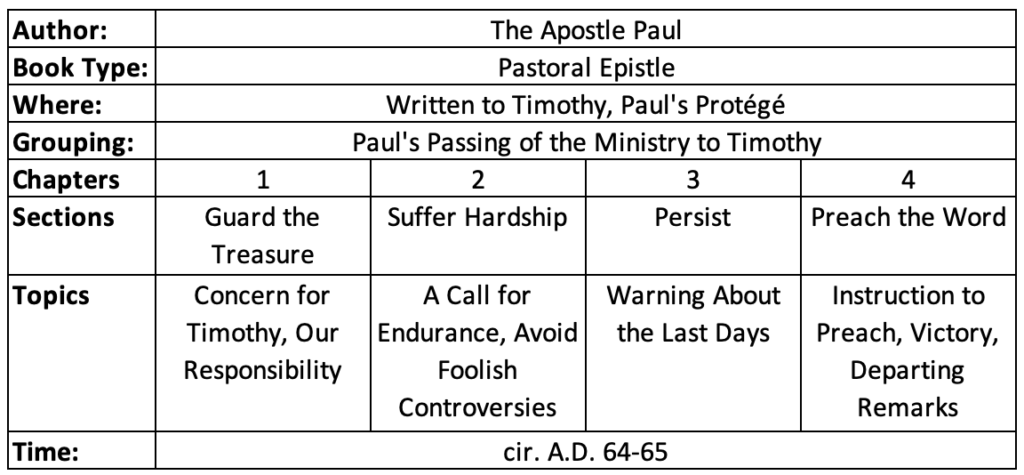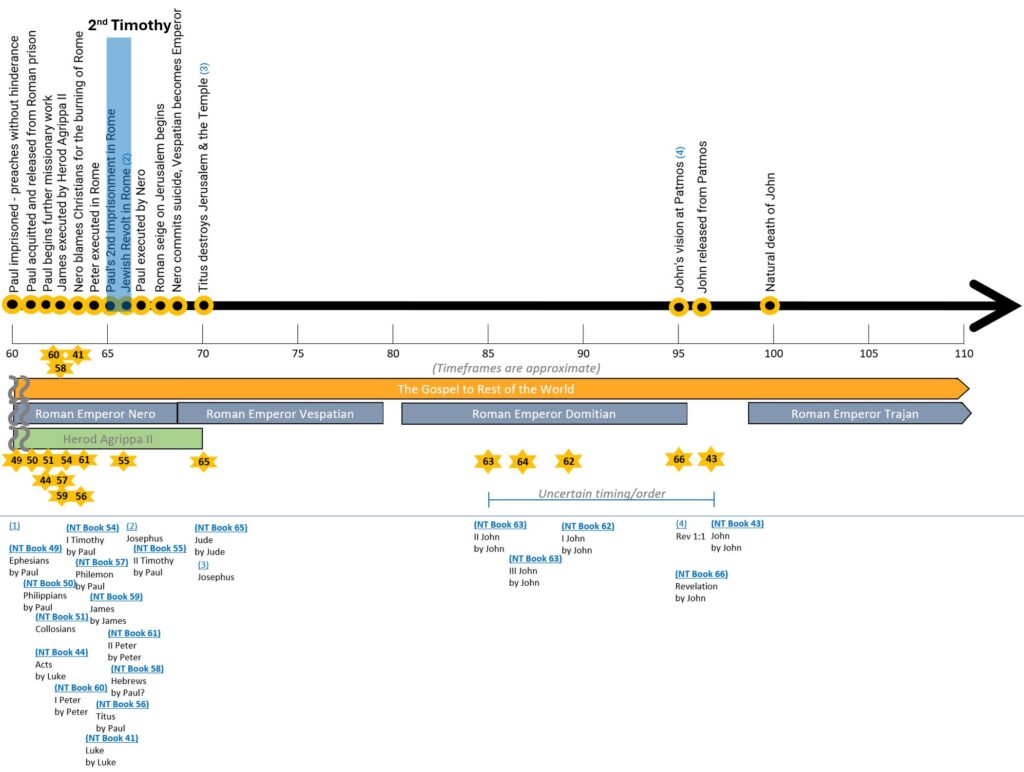2nd Timothy
Subtitle
Summary | About | Why You Should Read it | Author | When Written | Context | Timeline | Location | Outline | Observations | Resources
Summary
Paul’s second epistle to Timothy is one of Paul’s pastoral letters that was intended to edify and strengthen the younger protégé. This letter was the last of the documents written by Paul that we have included in the biblical canon. It was written just before his execution in Rome.
This letter provides strengthening and encouragement to the young pastor. Paul calls for endurance and to avoid foolish controversies, which had been plaguing the church. It also provides warning about the last days and gives instructions to go forth and preach the Word of God and spread the gospel of Jesus Christ.
From a church perspective, this epistle gives us Paul’s insight into how to deal with afflictions in the church and the expected activity of the church, as well as the expected allegiance of the church parishioners.
II Timothy contains a key verse that helps explain the mission of LearningGod.org. II Timothy 2:15 says, “Study to shew thyself approved unto God, a workman that needeth not to be ashamed, rightly dividing the word of truth.”
In this work we find the seven aspects of ministry, or you can think of it as our daily walk.
- Be Strong
- A Worthy Workman
- Be Faithful; Endure All Things
- Study to Rightly Divide the Word
- Avoid Vain Babblings
- Seal and Cleanse this Vessel of Honor
- Flee Youthful Lusts
It also addresses the apostacy in the last days in II Timothy 3. The antidote to this is the Word of God!
The table below is a high-level look at the structure and contents of 2nd Timothy.

About
II Timothy is the 16th book of the New Testament and the 11th book authored by Paul (in biblical order, not chronological order).

Why You Should Read It
This second letter to Timothy can be considered a personal letter Paul wrote by inspiration of the Holy Spirit to each one of us as believers. Paul encourages us to be strong and endure the hardships that are part of our everyday lives. We are told to avoid foolish controversies, which means infighting within the church.
Paul wants us to be aware of what to expect during the last days, which we are now in. He tells us how to avoid and combat the enemies of the gospel, which are all around us today. He encourages us to go out and preach the good news to the world that needs it so desperately.
This is Paul’s letter to us, encouraging us to fight the good fight! In it Paul tells us, “Study to shew thyself approved unto God, a workman that needeth not to be ashamed, rightly dividing the word of truth.” We are instructed to study the Word of God! The word “study” means intently, with diligence and purpose. This does not mean to just read it. We are to study it. It is by this diligence that we receive the supernatural gift of God in that He will give us understanding and wisdom that will build faith. God will reward those who truly want to know and walk in His ways!
Author
Paul is self-identified as the author in the first verse. This is consistent with the other Pastoral Letters of I Timothy and Titus. Some objections have been raised in recent years based on allegations of uncharacteristic vocabulary and style, but other evidence strongly supports Paul’s authorship.
When Written
Paul’s second letter to Timothy was written just before his execution in Rome at the hands of Nero. This was around 66 A.D. Paul had been imprisoned for a second time in Rome after being arrested, most likely in Troas, where his personal belongings were left behind suddenly. This was likely around 65 A.D.
Context
Paul was in prison in Rome for the second time. The first time, he had successfully appealed to Caesar and been released around 62 A.D. The Caesar at the time was Nero, and this was before the Christians were blamed for the burning of Rome that happened around 64 A.D. Paul was arrested again in 65 A.D. and this time, his accommodations were not the same as the first time, when he was in house arrest and had a nice villa that people could come and visit him at. His second imprisonment was in a dark, cold dungeon. Nero had developed a hatred for the Christians and had started persecuting them with executions by burning them alive in the streets and feeding them to the lions in the colosseum for the amusement of the crowds.
Paul was lonely. Phygelus and Hermogenes, “everyone in the province of Asia” (1:15), and Demas (4:10) had deserted him. Crescens, Titus and Tychicus were away (4:10-12), and only Luke was with him (4:11). Paul wanted very much for Timothy to join him. Timothy was his “fellow worker” (Rom 16:21), who “as a son with his father” (Phl 2:22) had served closely with Paul (1Co 4:17). Of him Paul could say, “I have no one else like him” (Phl 2:20).
Paul was concerned about the welfare of the churches during this time of persecution under Nero, and he admonishes Timothy to guard the gospel (1:14), to persevere in it (3:14), to keep on preaching it (4:2) and, if necessary, to suffer for it (1:8; 2:3).
He asked his good friend and protégé to bring him some of his personal belongings, such as his books and his cloak. He wanted to see Timothy one last time before his impending execution. Paul knew his time was almost up and wrote this as his farewell letter to his good friend. Despite the dire circumstance, it is Paul encouraging Timothy!
Timeline
The general order of events from the New Testament period of the early 60s to the early 100s is shown below. This letter was written in this timeframe.
Location
II Timothy was written from prison in Rome and sent to Timothy, who was in Ephesus.

Outline
Introduction (1:1-4)
Paul’s Concern for Timothy (1:5-14)
Paul’s Situation (1:15-18)
Special Instructions to Timothy (ch. 2)
Call for Endurance (2:1-13)
Warning about Foolish Controversies (2:14-26)
Warning about the Last Days (ch.3)
Terrible Times (3:1-9)
Means of Combating Them (3:10-17)
Paul’s Departing Remarks (4:1-8)
Charge to Preach the Word (4:1- 5)
Paul’s Victorious Prospect (4:6-8)
Final Requests, Greetings and Benediction (4:9-22)
Observations
- Paul’s last three epistles are often referred to the “Pastoral Epistles.” In order of writing, they are.
- 1 Timothy
- Titus
- 2 Timothy
- Timothy’s name is found more often in the salutations of Paul’s letter than any other. It is found in:
- 2 Corinthians
- 2 Thessalonians
- Philippians
- 1 Timothy
- Colossians
- 2 Timothy
- 1 Thessalonians
- Philemon
- 2 Timothy is Paul’s final book and is written from his prison cell in Rome.
- It appears that Paul may have been arrested in Troas due to the fact that there is where his personal belongings had suddenly been left.
- Paul asks Timothy to:
- Bring him his books, and especially the parchments.
- Bring him his cloak (coat).
- To do all of this before winter sets in.
- Paul calls Timothy a “good soldier of Jesus Christ.” 2:3
- Paul encourages Timothy to:
- “Stir up.” 1:6
- “Do not be ashamed.” 1:8, 12-13
- “Share with me in the sufferings.” 1:8
- “Hold fast . . . sound words.” 1:13
- “That good thing . . . keep.” 1:14
- “Be strong.” 2:1
- “Endure hardship.” 2:3
- “Be diligent to present yourself approved.” 2:5
- “Flee . . . pursue.” 2:22
- “Avoid” 2:23
- “You . . . must beware.” 4:15
- 2 Timothy 6:6-8 – “For I am already being poured out as a drink offering, and the time of my departure is at hand.I have fought the good fight, I have finished the race, I have kept the faith. Finally, there is laid up for me the crown of righteousness, which the Lord, the righteous Judge, will give to me on that Day, and not to me only but also to all who have loved His appearing.”
- Rest well, brother Paul . . . rest well!
Sections in II Timothy
- Guard the treasure 1
- Suffer hardship 2
- Persist! 3
- Preach the Word 4
Theme
- Paul’s passing of the ministry torch to Timothy and encouraging him to stay faithful in the midst of hardship.
- This was Paul’s goodbye letter.
Jesus in II Timothy
- Jesus is the Judge of the living and the dead, who strengthens us in times of weakness and rescues us in times of danger (3:11; 4:1, 17).

